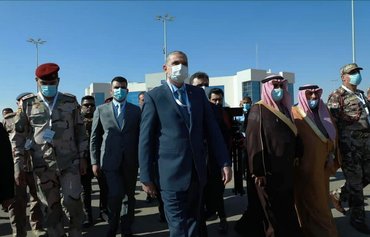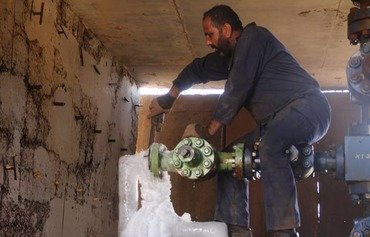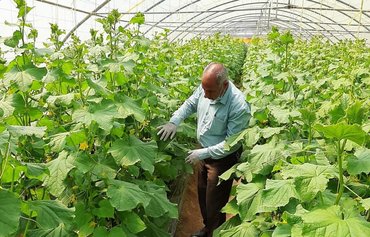Iraq has been working to attract Saudi investment to help with the cultivation of vast areas of desert land in Anbar and thereby revive the province's economy.
Saudi Arabia shares a long border with Iraq's westernmost province, and a number of prominent Saudi companies are currently operating there, including Almarai, which is investing in al-Rummana sub-district.
Anbar is the largest Iraqi province, constituting roughly one third of the country with an area of 138,500 square kilometers of mostly desert land.
The province's agricultural sector suffered heavy losses during the "Islamic State of Iraq and Syria" (ISIS) incursion, as the group seized cultivated fields and orchards and disrupted commerce, with many people forced to flee their homes.
Since declaring victory over ISIS, Iraq has been working to revive agricultural production in liberated areas and to cultivate the national production of strategic crops such as wheat and barley.
These efforts have included opening silos that will serve as collection and marketing outlets and securing the safe passage of trucks transporting crops to these storage sites.
This year, the Iraqi government presented a proposal to Saudi Arabia through a joint co-ordination council that seeks to foster economic and investment co-operation between the two countries.
Agricultural investment
The Saudi-Iraqi Co-ordination Council is currently considering investment in one million hectares of agricultural land in Anbar to develop and rehabilitate the agricultural sector, Iraq's Ministry of Commerce said last month.
"Although the project has yet to be officially approved and maps have yet to be drawn, if implemented, it will contribute to transforming vast areas of the Anbar desert into agricultural land," said Anbar's deputy agricultural director Muthanna Sebti.
Previous Iraqi governments tried to tackle this project, but the lack of access to water impeded implementation each time, he told Diyaruna.
"If the project is entrusted to a highly-experienced investment company that has the ability to manage the water file correctly, it is realizable and viable, as the soil of the Anbar desert is fertile and suitable for agriculture," he said.
"The Ministry of Agriculture, within only two years and in co-operation with the Anbar Agricultural Directorate, has been able to rehabilitate 65% of the agricultural land" reclaimed after the ISIS incursion, he said.
"Baghdad could boost its support for agriculture in Anbar by backing the new investment and providing facilities to Arab and foreign investors to stimulate agriculture in the province," he added.
Employment opportunities
The cultivation of desert areas, stretching from Ramadi to the country's border, would transform them from a safe haven for ISIS into agricultural fields that yield economic benefit, said Anbar provincial council member Naeem al-Koud.
"Security agencies in the province are today able to secure the entry of investors to any place in the province and protect their investments," he told Diyaruna.
Anbar province is protected by air cover, through surveillance from unmanned aircraft and by a large number of security personnel, he said.
The project to cultivate desert land could lead to the employment of thousands of workers, Anbar provincial council member Fahd al-Mishaan told Diyaruna.
"Employing the youth and securing a stable source of income for them will keep them from joining terrorist groups, which are constantly trying to recruit them by enticing them with money and exploiting their financial need," he said.
Likewise, "terrorism cannot establish a foothold in thriving cities", he added.
Linking Iraq with neighbouring countries through common economic interests will help to strengthen security co-operation, he noted, and thus contribute to "the elimination of terrorism and to enhancing border control".

![Iraqis work in a field near the Bzeibez bridge at the border between Baghdad and Anbar province on June 14th, 2016. [Sabah Arar/AFP]](/cnmi_di/images/2018/05/22/12667-Iraq-agriculture-Bzeibez-600_384.jpg)







Peace be upon you! Please create job opportunities for agricultural engineers through these projects.
Reply3 Comment(s)
Hahahah. Naim Kaud was abducted and he now talks seriously about agriculture! You can’t even defend yourself from kidnapping and now want to roam the valleys of Ramadi.
ReplyIf an investor comes and cultivates the desert, what benefit will Iraq get?
Reply3 Comment(s)